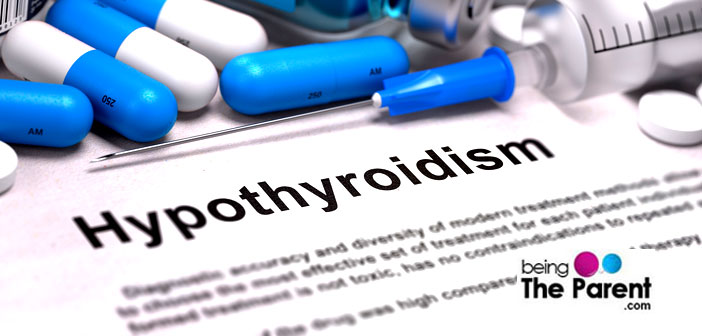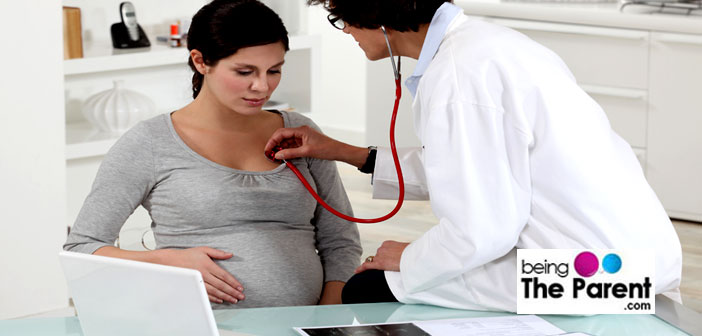Even during her most fertile years, there are numerous factors that hinder a woman’s chances to get pregnant. Some of these factors are with in her control, like lifestyle, but some other factors are beyond her control.
One of the most common factors that impedes conception is the improper function of the thyroid gland. Getting pregnant with hypothyroidism is not that easy. The thyroid gland is one of the large, butterfly-shaped gland that is located below the larynx near the front of the neck. The thyroid gland releases hormones that control metabolism.

What Is Hypothyroidism?
Hypothyroidism is a situation in which an underactive thyroid gland produces an inadequate amount of thyroid hormones. Pregnant women should especially be concerned with their thyroid levels because the condition may have serious implications. The prevalence of hypothyroidism in pregnancy is around 2.5% according to western countries, while in India, the prevalence rates range from 4.8% to 11%.
What Are The Causes Of Hypothyroidism?
Hypothyroidism is usually caused when the thyroid gland either fails to work normally or is not being stimulated properly by the pituitary gland or hypothalamus.
Other causes are:
- Iodine imbalance: Iodine is essential for the production of thyroid hormones. When the supply of iodine is inadequate, hypothyroidism takes over. Excessive iodine intake will also trigger hypothyroidism. Women from iodine-deficient areas of the country are subjected to hypothyroidism
- Exposure: Exposure to heavy metals like mercury is found to cause hypothyroidism
- Thyroid surgery: Any type of surgery that results in partial or full removal of the thyroid gland during the treatment of thyroid cancer, goitres, hyperthyroidism, etc. will affect the production of thyroid hormones resulting in hypothyroidism
- Stress: As the stress increases, cortisol, the main hormone released by the adrenal gland also increases. Cortisol inhibits the normal thyroid hormone level causing hypothyroidism
- Thyroiditis: This is an inflammation of the thyroid gland. During the first stage, the thyroid hormone leaks out to the bloodstream resulting in hyperthyroidism. However, after a month or two, it usually develops into hypothyroidism. In spite of viral or bacterial infections pregnancy is also found as a factor that triggers this situation
- Hashimoto’s disease: It is an autoimmune disease (the body’s immune system attacks the body’s own cells) attacking the thyroid gland causing inflammation and hindering its ability to produce hormones
Read on symptoms of hypothyroidism here.
How Does Hypothyroidism Affect Conception And Safe Pregnancy?
Thyroid disorders are found to cause significant reproductive problems among women. Good thyroid function is a must for the ability to conceive and maintain a healthy pregnancy. A woman’s menstrual cycle can be disrupted due to hypothyroidism making it difficult for her to conceive.
Even if you conceive with hypothyroidism, the complications like preeclampsia, miscarriage, low birth weight, pre-term delivery, anaemia, postpartum haemorrhage can arise.
Since thyroid hormones are crucial for the development of the brain and nervous system of the fetus, if the condition is not treated adequately, a baby may be born with some degree of mental retardation. Other complications that may affect the child are, low birth weight, stillbirth, birth defects, thyroid problems, premature birth, etc.
Read about pregnancy risks with hypothyroidism here.
When Should I Go For A Thyroid Function Test?
The below scenarios should be taken as mandatory circumstances for getting your TSH and T4 levels checked.
Thyroid Profile Test Before Conceiving
You should go for a full thyroid evaluation by conducting a simple blood test to measure the level of TSH (thyroid-stimulating hormone) and the level of thyroid hormone, thyroxine when:
- You cannot conceive even after trying for six months without any other significant health issues
- You have a family history of thyroid disorders
- You are cold intolerant
- You experience joint and muscle pain
- You experience significant hair loss
- You have constipation, which can even be chronic
- Your menstrual cycle is irregular and you undergo severe period pain
- You gain weight noticeably and are not able to lose the weight even after following a healthy diet and exercises. Click here to read about top exercise tips and dietary tips for hypothyroidism
- You have undergone more than two miscarriage
- You feel extreme fatigued and lethargic
Two or more of the above symptoms can be an indication of hypothyroidism.
Low level of thyroxine and high level of TSH in the test points out hypothyroidism. An elevated level of TSH and low level of thyroxine can also result in irregular ovulation or no ovulation at all.

Thyroid Profile Test After Conceiving
Your doctor will suggest a thyroid function test early in your pregnancy if:
- You have a strong history of thyroid disease
- If you have an autoimmune disease such as lupus or type 1 diabetes
- If you undergo previously radiation to the neck
- If you exhibit the symptoms mentioned above
- If you are above thirty years as the chances of hypothyroidism increases with the age
What Measures Can Be Taken Before Conception If I Have Hypothyroidism?
When you are diagnosed with hypothyroidism, treating and controlling the disorder before conceiving is important. This will help to avoid unnecessary complications. Hypothyroidism affects the unborn child before many women realize they are pregnant. This is because the child depends on the mother for thyroid hormone until his own thyroid gland starts to function. This will happen only after 12 weeks of pregnancy.
Your doctor will provide you an oral medication of synthetic thyroid hormone called synthetic thyroxine, which is identical to T4 produced by the thyroid gland, to restore adequate hormone levels. Determining the dosage is a time taking process. Once the adequate dosage is taken daily, most of the symptoms regarding hypothyroidism start to fade away.
The treatment is simple and safe and the menstrual cycle will return to normal within weeks. Once the ovulation becomes normal you can try getting conceived. You also should include antioxidant-rich fruits and vegetables in your daily menu. Examples: blueberries and tomatoes.
What Is Subclinical Hypothyroidism?
This is a mild form of hypothyroidism that shows no apparent symptoms. It is found among two to three per cent of pregnancies. This can be detected in a TSH test. Even though it is mild, when subclinical hypothyroidism is discovered during pregnancy, treatment is recommended to ensure a healthy pregnancy.
What Measures Should Be Taken During Pregnancy When I Have Hypothyroidism?
When you are already under treatment for hypothyroidism, when you get pregnant consult you must your doctor immediately. Maintaining a healthy pregnancy is equally challenging as getting pregnant when you have hypothyroidism. Uncontrolled hypothyroidism of mothers has a long-term effect on children.
- Your body needs more thyroid hormone during pregnancy. The treatment is similar to when you were not pregnant
- As you have preexisting hypothyroidism, your doctor will increase the dose of synthetic thyroxin to maintain normal thyroid functions
- Thyroid function is checked every six to eight weeks during the course of pregnancy. During the first half of pregnancy, it is suggested to check the TSH level monthly
- Monitoring the thyroid-stimulating hormones (TSH) and regularly adjusting the medication dose accordingly is a routine practice during pregnancy. This will help to maintain a steady blood level of thyroid hormone
- During pregnancy medication is found to increase up to 50% in dosage (mostly during the first trimester as the baby doesn’t possess his own hormone)
- Generic brand or brand named medicines both are fine to take. But never switch on to a generic medicine from a branded one or vice versa suddenly when you are pregnant. Stay with the same medicine you used to take before conception throughout your pregnancy period
- It is safe to take thyroid medication during your pregnancy as it will not cause any harm to your baby. What harms your baby is if you do not take the dose of thyroid as prescribed by your doctor
These are only guidelines. The treatment differs according to age and general health conditions. Only your doctor can find an apt method that suits you.
